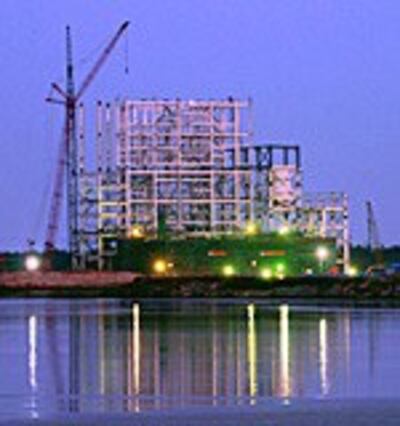
HONG KONG—Construction of a U.S.$743 million power station in China’s booming southern province of Guangdong has been stalled for weeks amid a dispute with local residents over compensation.
Residents of Dongzhou village, near Shanwei city in the eastern part of the province, rejected government proposals to pay them 600,000 yuan (U.S.$74,000) a year in compensation for land taken up by the power plant.
“Dongzhou has a population of around 30,000 people, so that works out at between 10 and 15 yuan per person per month,” a local representative surnamed Huang told RFA’s Mandarin service.
'Toilet paper'
“To put it bluntly, that’s not even enough to buy toilet paper. We villagers think that this is unreasonable.”
Faced with a series of broken-down negotiations, the government has begun sending officials to the area to canvass local residents, trying to get them to change their minds.
“They have been sending officials with roots here in Dongzhou to talk to the villagers in the past couple of days,” a Dongzhou representative surnamed Lin said.
“They held a meeting at which they handed out red packets [of money] to all who attended. But only about 20 people turned up,” he added.
Lin said the government was also trying to use strong-arm tactics to win the dispute.
Rumors of military crackdown
“They have sent people’s relatives to the area around the power station to tell people that the army is about to move into the area with a special weapon, and that no one will escape,” he said.
As time drags on, villagers say, the officials sent to mediate the dispute are becoming more and more senior.
Shanwei deputy mayor Li Min has already traveled to Dongzhou, where he spoke to RFA’s Hong Kong-based reporter, Ding Xiao.
“It is illegal to impede the progress of a key infrastructure project,” Li said. “As for whether the compensation is reasonable, it was in line with the usual standards. The government is remaining open to the people’s demands and will entertain any reasonable requests.”
“As for the Baisha Lake area, we will be compensating the affected households in a number of ways. The Communist Party always puts the people first. The government has already been very restrained,” he said.
“I hope that you [RFA] will tell them this. We know that you have been in contact with the villagers.”
Protest leaders under pressure
Dongzhou representative Huang dismissed Li’s comments.
“This is all lies. There has been no compensation in the Baisha Lake area. Ever since last year, the government has been evading the demands of local residents.”
“Now all the villagers have come out to protest in favor of our collective interests. But the government is holding us [the representatives] responsible for the whole affair,” Huang said.
Huang said that local police had prevented him from leaving Shanwei on business with a letter ordering him to stay in the area Oct. 24.
Letter from police
“The letter said I wasn’t allowed to leave Shanwei because a court case was still pending following my arrest in July,” he said.
“They must have been listening to my phone calls, because that’s when I told someone I was leaving town,” Huang added.
Work on the first phase of the 6 billion yuan Shanwei power plant began in December 2004. The two units of the project had been scheduled for completion at the end of 2006 and 2007 respectively.
An English-language news report on a Guangdong news Web site said that construction at the plant was “going on smoothly.”
Original reporting in Mandarin by Ding Xiao. RFA Mandarin service director: Jennifer Chou. Translated and written in English by Luisetta Mudie. Edited by Sarah Jackson-Han.
